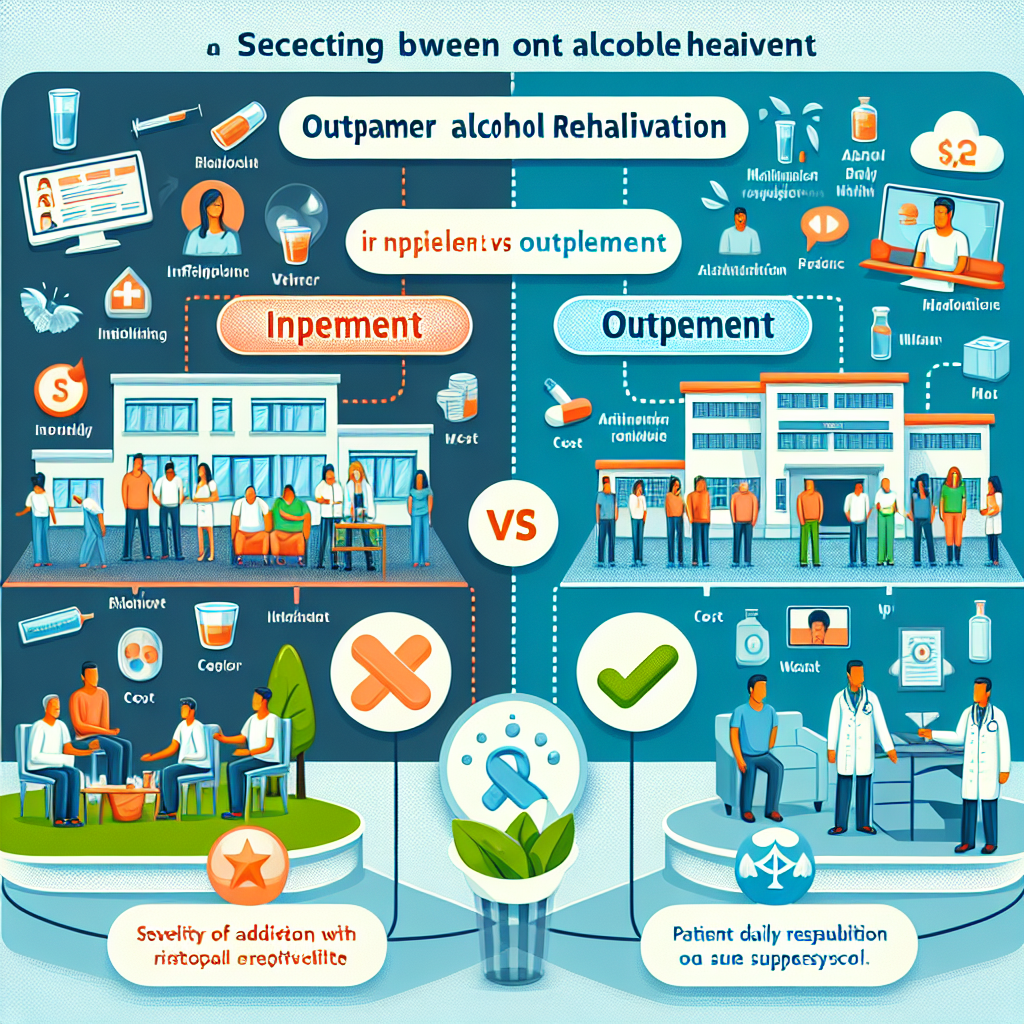-
Table of Contents

“Find Your Path to Recovery: Choosing Between Inpatient and Outpatient Alcohol Rehab”
Introduction
Choosing between inpatient and outpatient alcohol rehab is a critical decision that can significantly impact an individual’s recovery journey. Inpatient rehab, also known as residential treatment, involves staying at a facility for a designated period, providing a structured environment with 24/7 medical and emotional support. This option is often ideal for those with severe addiction, co-occurring mental health disorders, or a history of relapse. On the other hand, outpatient rehab allows individuals to live at home while attending scheduled treatment sessions, offering greater flexibility and enabling them to maintain work, school, or family commitments. This approach may be suitable for those with milder addiction or strong support systems at home. Factors such as the severity of addiction, personal responsibilities, financial considerations, and the presence of a supportive home environment should all be carefully weighed when deciding between inpatient and outpatient alcohol rehab.
Key Factors to Consider When Choosing Between Inpatient and Outpatient Alcohol Rehab
Choosing the right type of alcohol rehab is a critical decision that can significantly impact your journey to recovery. Both inpatient and outpatient rehab programs offer unique benefits and challenges, and understanding these can help you make an informed choice. One of the first factors to consider is the severity of your addiction. Inpatient rehab, also known as residential treatment, is often recommended for individuals with severe alcohol dependency. This type of program provides a structured environment where patients can focus entirely on their recovery without the distractions and temptations of everyday life. On the other hand, outpatient rehab is typically more suitable for those with milder forms of addiction or for those who have already completed an inpatient program and are looking for continued support.
Another crucial factor is the level of support you need. Inpatient rehab offers 24/7 medical and emotional support, which can be invaluable for those who experience intense withdrawal symptoms or have co-occurring mental health disorders. The constant supervision ensures that any complications are promptly addressed, providing a safer environment for recovery. Conversely, outpatient rehab allows you to maintain your daily responsibilities, such as work, school, or family commitments, while still receiving treatment. This flexibility can be particularly beneficial for those who have a strong support system at home and can manage their recovery with less intensive supervision.
Financial considerations also play a significant role in the decision-making process. Inpatient rehab programs are generally more expensive due to the comprehensive care and accommodations provided. However, many insurance plans cover a portion of the costs, and some facilities offer sliding scale fees based on your financial situation. Outpatient rehab is often more affordable and may be a more viable option for those with limited financial resources. It’s essential to weigh the costs against the potential benefits to determine which option aligns best with your financial situation and recovery goals.
The duration of the treatment program is another aspect to consider. Inpatient programs typically last from 28 days to several months, depending on the individual’s needs and progress. This extended period allows for a more in-depth focus on recovery, including therapy, education, and skill-building activities. Outpatient programs, however, can vary widely in duration and intensity, ranging from a few hours a week to several hours a day. This flexibility allows you to tailor the program to fit your schedule and needs, making it easier to integrate treatment into your daily life.
Personal preferences and lifestyle are also important when choosing between inpatient and outpatient rehab. Some individuals thrive in the immersive environment of inpatient rehab, where they can fully disconnect from their usual surroundings and focus solely on their recovery. Others may find the ability to stay connected with their daily life and loved ones through outpatient rehab more motivating and supportive. It’s essential to consider what environment will best support your recovery and help you stay committed to your goals.
Ultimately, the decision between inpatient and outpatient alcohol rehab should be based on a comprehensive evaluation of your specific needs, circumstances, and goals. Consulting with healthcare professionals, such as addiction specialists or counselors, can provide valuable insights and recommendations tailored to your situation. Remember, the most important step is seeking help and committing to your recovery journey. With the right support and treatment plan, you can overcome addiction and build a healthier, more fulfilling life.
Pros and Cons of Inpatient vs. Outpatient Alcohol Rehab: Making the Right Choice
Choosing between inpatient and outpatient alcohol rehab is a significant decision that can profoundly impact one’s journey to recovery. Both options offer unique advantages and potential drawbacks, and understanding these can help individuals make an informed choice that aligns with their personal needs and circumstances.
Inpatient rehab, also known as residential treatment, involves staying at a facility for a designated period, typically ranging from 28 days to several months. One of the primary benefits of inpatient rehab is the structured environment it provides. This setting removes individuals from their usual surroundings, which may be filled with triggers and temptations, and places them in a supportive, controlled environment. This can be particularly beneficial for those with severe addiction, as it allows for intensive, round-the-clock care and supervision. Additionally, inpatient rehab often includes a comprehensive range of therapies, including individual counseling, group therapy, and holistic treatments such as yoga and meditation, all designed to address the physical, emotional, and psychological aspects of addiction.
However, inpatient rehab is not without its challenges. The most notable drawback is the disruption to daily life. Committing to a residential program means taking time away from work, family, and other responsibilities, which can be difficult for many individuals. Moreover, inpatient treatment can be costly, and while many insurance plans cover some of the expenses, out-of-pocket costs can still be significant. Despite these challenges, the immersive nature of inpatient rehab can provide a solid foundation for long-term recovery, making it a worthwhile consideration for those with severe or long-standing addiction issues.
On the other hand, outpatient rehab offers a more flexible approach to treatment. This option allows individuals to live at home and continue with their daily routines while attending scheduled therapy sessions and support groups. The flexibility of outpatient rehab makes it an attractive option for those who have work, school, or family commitments that they cannot put on hold. Additionally, outpatient programs tend to be more affordable than inpatient ones, making them accessible to a broader range of people.
Nevertheless, outpatient rehab also has its limitations. The primary concern is the potential for exposure to triggers and temptations in one’s everyday environment. Without the constant supervision and support provided by an inpatient facility, individuals may find it more challenging to maintain sobriety, especially in the early stages of recovery. Furthermore, the success of outpatient rehab heavily relies on the individual’s level of commitment and self-discipline. Those who lack a strong support system at home or who struggle with severe addiction may find it difficult to achieve the same level of success as they might in an inpatient setting.
Ultimately, the decision between inpatient and outpatient alcohol rehab should be based on a thorough assessment of one’s personal situation, including the severity of the addiction, the presence of a supportive home environment, and the ability to commit to the demands of the chosen program. Consulting with healthcare professionals and addiction specialists can provide valuable insights and help tailor a treatment plan that best suits the individual’s needs.
In conclusion, both inpatient and outpatient alcohol rehab have their respective pros and cons. Inpatient rehab offers a structured, immersive environment that can be crucial for those with severe addiction, while outpatient rehab provides flexibility and affordability, making it suitable for individuals with milder addiction or strong external support. By carefully weighing these factors and seeking professional guidance, individuals can make an informed decision that sets them on the path to successful recovery.
Q&A
1. **Question:** What are the primary differences between inpatient and outpatient alcohol rehab?
**Answer:** Inpatient rehab requires patients to live at the treatment facility for the duration of the program, providing 24/7 care and a structured environment. Outpatient rehab allows patients to live at home and attend treatment sessions at scheduled times, offering more flexibility but less intensive supervision.
2. **Question:** What factors should be considered when choosing between inpatient and outpatient alcohol rehab?
**Answer:** Factors to consider include the severity of the addiction, the presence of co-occurring mental health disorders, the patient’s home environment, their ability to take time off work or family responsibilities, and the level of support they need to maintain sobriety.
Conclusion
Choosing between inpatient and outpatient alcohol rehab depends on several factors, including the severity of the addiction, the presence of co-occurring mental health disorders, the individual’s home environment, and their personal and professional responsibilities. Inpatient rehab offers a structured, immersive environment ideal for those with severe addictions or unstable home situations, providing 24/7 medical and emotional support. Outpatient rehab, on the other hand, allows individuals to maintain their daily responsibilities while receiving treatment, making it suitable for those with milder addictions or strong support systems at home. Ultimately, the decision should be made in consultation with healthcare professionals who can assess the individual’s specific needs and circumstances.



